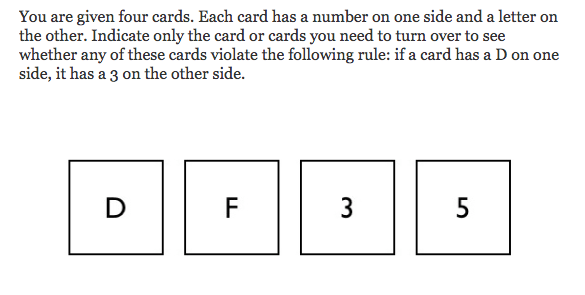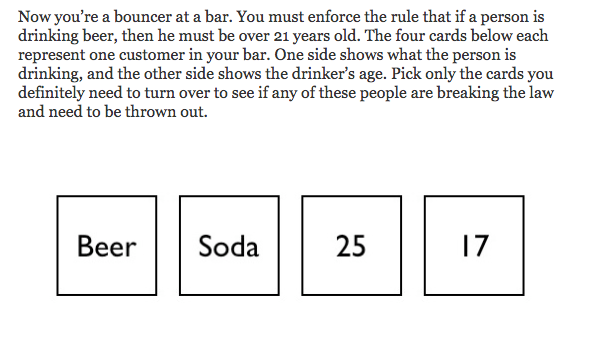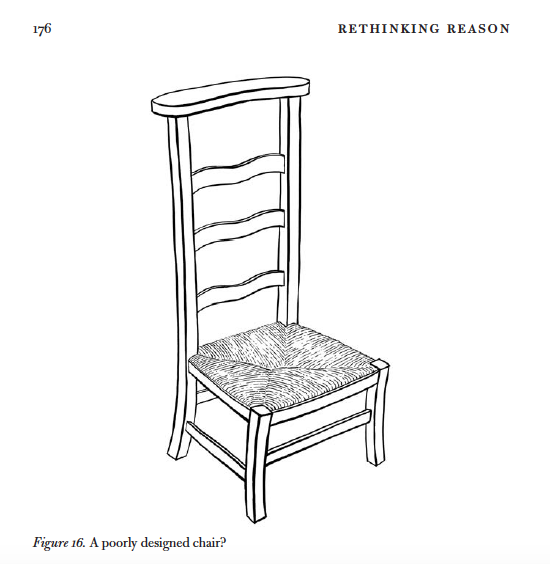Intelligence
The Purpose of Brainpower: Are We "Misusing" Our Minds?
Research shows that language and reasoning did not evolve for truth-seeking.
Posted February 11, 2019

Why are humans so smart? Compared to other animals, we are unique in our mental abilities. No other animal has built skyscrapers, developed dentistry, or invented the wheel.
Underage Drinking and Wheeled Suitcases
Speaking of wheels, humans have been traveling the globe relatively easily since at least the invention of the steamship. But no one thought to put wheels on a suitcase until 1970. And wheels weren’t commonly added to suitcases until 1987. Why? Psychology professor William von Hippel discusses this in his fantastic new book, The Social Leap.
Maybe this problem will help us figure it out. See if you can solve it:

Not so easy, right? More than 75% of people get it wrong.
But what about this one:

This one was probably easier for you to solve. About 65% of people get it right.
But this is the same problem as the one before. Both questions use the same logic: If P, then Q.
The answer to the first puzzle is D and 5. The answer to the second puzzle is Beer and 17.
Why are we better at figuring out if someone is breaking the law than whether a card should have a specific letter on the other side?
The first question involves formal logic. The second question involves social rules. And we are very good at figuring out who breaks them. But we’re not so great at formal logic.
The Social Brain Hypothesis
One answer for this, according to von Hippel, comes from the social brain hypothesis. The idea is that we have big brains because our ancestors had to navigate complicated social dynamics.
For early humans, their most complex puzzles often involved figuring out the minds of their fellow humans. And their social status relied on their ability to solve social challenges. Our ability to reason about non-social problems is a fortunate side-effect of our social reasoning skills.
As von Hippel says, “it suggests that IQ is a by-product of social intelligence rather than the other way around.” We are social innovators more than technical ones.
He also says, “our intelligence didn’t evolve to solve abstract problems and complex ways of dealing with the environment. Our intelligence evolved to deal with each other more effectively and to leverage the skills and abilities we have when we work together.”
The reason more than a century passed between global travel and suitcases with wheels is because our brains evolved for social solutions rather than technical ones. If you have trouble lifting something, the first thing that comes to mind is to ask someone else for help, not to invent a new product.
Doctors and Kings
Here’s another puzzle:
1 percent of people pass a test. 80 percent of people who pass the test become the king. 9.6 percent of people who do not pass the test also become king. A person becomes the king. What is the probability that the person passed the test?
This is a tough question. But not overwhelming. Most of the 1 percent who pass the test become king (0.8 percent of people). Of the 99 percent who do not pass the test, a little less than a tenth still become king (9.5 percent of people). What portion of kings (who make up 10.3 percent of people) belongs to the test-passing group?
From here, you can estimate that the answer is slightly below 10 percent. It's actually 7.8 percent.
About 85 percent of doctors get the answer wrong. What’s going on here?
Well, doctors don’t respond to that specific question incorrectly, but this one:
1 percent of women at age forty who participate in routine screening have breast cancer. 80 percent of women with breast cancer will get positive mammograms. 9.6 percent of women without breast cancer will also get positive mammograms. A woman in this age group had a positive mammogram in a routine screening. What is the probability that she actually has breast cancer?
Most doctors estimate around 70-80 percent. But the cancer solution is the same as the king solution: 7.8 percent. We are bad at formal logic, but good at social reasoning. Figuring out if a king passed a test comes more easily to us than figuring out if a positive mammogram means a person has cancer.
The Enigma of Language
In fact, cognitive scientists Dan Sperber and Hugo Mercier argue that our intellectual abilities evolved mostly to convince other people of our point of view. In their book The Enigma of Reason, they elaborate on how reason likely emerged to justify ourselves to others and to persuade them and ourselves. Reason can be used to seek the truth, but that’s not what it was originally intended for.
They compare using reason for truth-seeking to using a church kneeler as a chair. Sure, it works. But it’s a bit awkward and sometimes uncomfortable.

Another way to think about it is that using reason for truth-seeking is like using a fingernail as a screwdriver.
Moreover, using reason involves the use of language. Now, it’s true that language emerged among early humans to transmit crucial information. Where to find water, which plants are edible, how to build tools.
But others suggest language has another purpose in addition to sharing information. In Pre-Suasion, social psychologist Robert Cialdini reports research from psycholinguist Gün Semin. Cialdini writes, “the main purpose of speech is to direct listeners’ attention to a selected sector of reality.” In short, language is for persuasion.
Cialdini goes on to say, “When describing our evaluation of a film, the intent is not so much to explain our position to others as to persuade them to it.” We want to influence others to our way of thinking.
Say Something Cool
Then there’s showing off. In their stunning book, Elephant in the Brain, Kevin Simler and Robin Hanson argue that the purpose of language is to show how cool we are to potential allies and romantic partners. As they put it, “Speakers are eager to impress listeners by saying new and useful things, but the facts themselves can be secondary.”
This means we not only understand that a speaker knows interesting things, but we also recognize that the speaker is the kind of person who knows interesting things. Thus, the speaker might make a good romantic partner or friend.
Simler and Hanson conclude, “Conversation, therefore, looks on the surface like an exercise in sharing information, but subtextually, it’s a way for speakers to show off their wit, perception, status, and intelligence, and (at the same time) for listeners to find speakers they want to team up with.”
Of course, none of this means we can’t or shouldn’t use reason and language to seek the truth. Facts are important. In citing "misuse" in the title of this essay I mean that we often use language and reasoning for something other than their originally intended purposes. We should be mindful of the original purpose of language and reasoning when we're trying to seek the truth. We're using our fingernail as a screwdriver.




